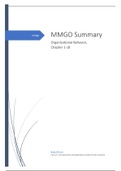mmgo MMGO Summary
Organizational Behavior,
Chapter 1-18
BakedToast
FACULTY OF INDUSTRIAL ENGINEERING & INNOVATION SCIENCES
,Plan of the Book
1
, CHAPTER 1
Introduction to Organizational Behavior
The importance of interpersonal skills:
Interpersonal skills are very important. The first years of your career you can get by on technical
knowledge (economics, accounting, finance and quantitative techniques, which used to be the focus
of business schools until the late 1980s), but after that you need interpersonal skills (teamwork,
effective communication, leadership and cultural awareness).
Positive social relationships with coworkers and bosses are strongly related to job satisfaction. A
manager with good interpersonal skills ‘is likely to make the workplace more pleasant’.
Employability= ‘The ability to gain and maintain employment’
Graduates often only have the technical skills that they require to enter the workforce, but they lack
interpersonal skills/time management.
Managers should have certain skills: (1) technical skills, (2) human skills, and (3) conceptual skills.
Managers perform 10 different, highly interrelated roles or sets of behaviours:
Interpersonal roles Informational Decisional
• Figurehead • Monitor • Entrepreneur
• Leader • Disseminator • Disturbance handler
• Liaison • Spokesperson • Resource allocator
• Negotiator
What managers do:
Managers: An individual who achieves goals through other people’. Sometimes referred to as
administrators.
Organization: A consciously coordinated social unit, composed of two or more people, that functions
on a relatively continuous basis to achieve a common goal or set of goals’
The functions of a manager and their definitions:
1. Planning: ‘A process that includes defining goals, establishing strategy and developing plans
to coordinate activities’
2. Organizing: ‘Determining what tasks are to be done, who is to do them, how the tasks are to
be grouped, who reports to whom and where decisions are to be made’
3. Leading: ‘A function that includes motivating employees, directing others, selecting the most
effective communication channels and resolving conflicts’
4. Controlling: ‘Monitoring activities to ensure that they are being accomplished as planned and
correcting any significant deviations’
Management Skills:
- technical skills: ‘The ability to apply specialised knowledge or expertise.’
- human skills: ‘the ability to work with, understand and motivate other people, both
individually and in groups’
- conceptual skills: ‘The mental ability to analyse and diagnose complex situations.’
2
, Effective versus successful managerial activities:
Fred Luthans and his associates asked the questions ‘Do managers who move up the quickest in an
organization do the same activities and with the same emphasis as managers who do the best job?’
One could expect that the most effective managers are the ones that are promoted the most, but
this is not the case.
According to Luthans, managers engage in:
1. Traditional management: Decision making, planning and controlling
2. Communication: Processing paperwork and exchanging routine information
3. Human resource management: Motivating, disciplining, managing conflict, staffing, training.
4. Networking: Socialising, politicking and interacting with outsiders
Their conclusion? Successful (as in their promotion speed)
managers network a lot, effective (=quantity and quality
of their performance & satisfaction and commitment of
employees) managers spend more time communicating.
Thus, promotions are not just based on performance, but
also on networking.
Managers Roles: Mintzberg’s managerial roles
1






